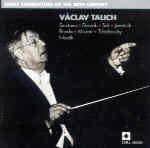This Václav Talich set is one of the plums of EMI’s Great Conductors of the 20th Century series. Born in 1883, Talich led the Czech Philharmonic for more than 25 years, directed Prague’s National Theatre opera for a decade, and created the Slovak Philharmonic during a period when politics exiled him from the capital. Despite a limited recording career, he’s still considered one of the “greats” of the last century’s podium lions, a distinction amply demonstrated here. Not surprisingly, EMI focuses on Czech music in this two-disc compilation; the only non-Czech works are a live Mozart Symphony No. 33 and a brief movement from Tchaikovsky’s Suite No. 4. Talich’s Mozart is lean and lithe, with clipped phrase endings and unimpeded forward motion reminiscent of Toscanini’s performances of classical-era symphonies.
Dvorák looms large in this set, with Talich’s New World Symphony from 1954 (his third and best recording of the work) and the eerie tone poem about a water-bound creature who snatches a human bride, The Water Goblin, a live concert recording from the same year. Talich’s New World is one of the great ones, shorn of sentimentality and notable not only for the lift the conductor gives to the rhythms, but also for the carefully molded phrasing and the intensity of the outer movements. The Largo is exceptionally beautiful, marginally more flowing than the 1949 version, more expansive than in 1941. The Water Goblin has a momentum that binds together the narrative strands, but within that framework Talich brings out numerous captivating details–the precision of the opening’s strolling gait, the plaintive winds in the slow central section, the dirge-like passage at the 13-minute mark, the breadth of phrasing in the mellow strings, and the winds in the coda.
Joseph Suk’s Serenade for Strings is described in the booklet notes as “enchanting”, which has to be the understatement of the year. It’s an utterly captivating, gorgeous work, suffused with lyric poetry and, especially in the Adagio, an ethereal beauty that makes its relative obscurity puzzling. Talich gave the premiere of Janácek’s Sinfonietta and led a National Theatre revival of The Cunning Little Vixen, then arranged it into an orchestral Suite drawing heavily on Act 1’s forest scenes. It’s played here with enthusiastic verve, capturing the flavor of the original while proving eminently capable of standing on its own as a concert piece.
Fillers include full-blooded Smetana–Sarka and Prague Carnival; a delightful pocket Symphony for Strings all of six minutes long by the 18th-century Czech composer Georg Benda; and a charming movement, The Amorous Couple, from Novák’s Moravian-Slovák Suite. Everything on these two discs is in early-1950s monophonic sound, which may be a problem for those who absolutely must have stereo. More critical though, is the glare in some of the transfers, most damaging in the Suk work, where steely violins subvert the lyricism of the piece. Consider such comments a cautionary footnote to a warm recommendation. [3/17/2003]
































